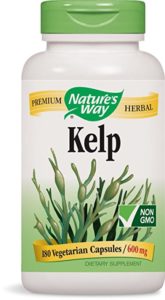Iodine helps protect against thyroid disease by maintaining healthy levels of hormones and enzymes within the body. Read on to learn about the Best Iodine Supplements of 2024.
Iodine is an essential nutrient for human health, and iodine supplements are a great way to ensure you’re getting enough. But with so many different iodine supplements on the market, how do you know which one is the best?
Welcome to my blog, where I’ll rank the best iodine supplements of 2022. I’ll be considering factors like price, effectiveness, and side effects to help you choose the right supplement for you. So check back often and let me help you find the perfect iodine supplement for your needs.
Key Takeaways:
- Iodine is crucial for thyroid health, regulating metabolism, growth, and development.
- Deficiency in iodine may lead to thyroid dysfunction, goiter, hypothyroidism, and mental retardation.
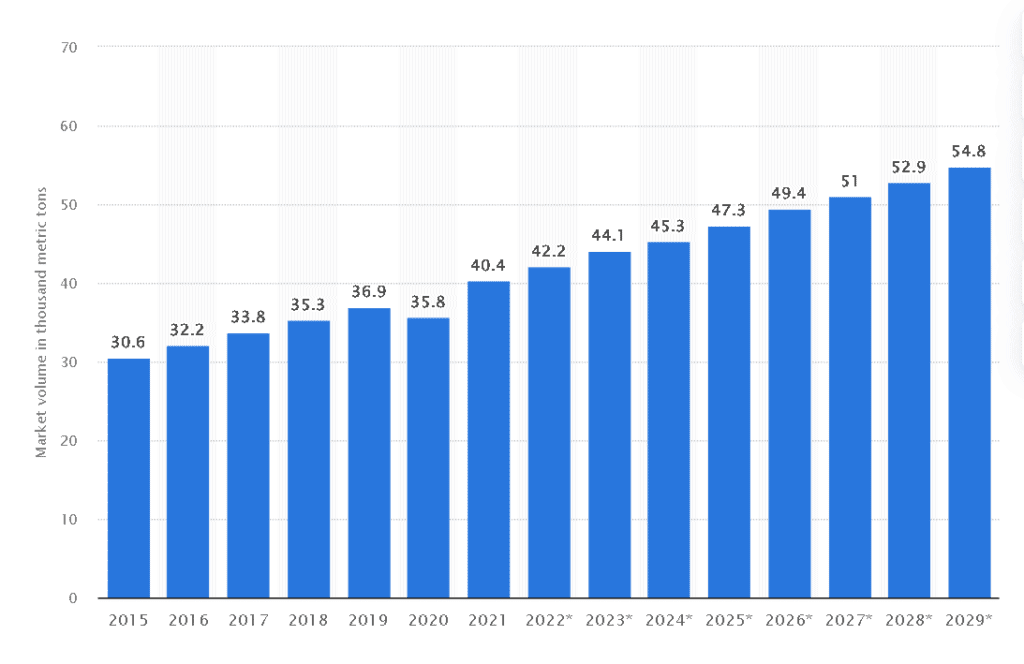
Source: Statista
The importance of iodine for your health
Iodine is an essential trace element that is required for the production of thyroid hormones. Thyroid hormone plays an important role in regulating metabolism, growth, and development. It is essential for maintaining good health. A lack of iodine may cause thyroid dysfunction, which includes goiter (enlarged thyroid gland), hypothyroidism (underactive thyroid gland), and cretinism (mental retardation).
Iodine is an essential micronutrient that helps the body make thyroid hormones. Thyroid hormones are important for regulating metabolism, growth, and development.
Iodine can be found in certain foods, such as seafood, dairy products, and eggs. It is also added to some salt products and is available in supplement form. Including iodine-rich foods, in the diet or taking supplements can help prevent iodine deficiency.
What are the best iodine supplements?
Iodine is a mineral that’s essential for human health. It is necessary to produce thyroid hormone for brain development during pregnancy and infancy. If you don’t get enough iodine from your diet, you may develop goiter (a swelling of the thyroid gland), which can cause mental retardation and other serious illnesses.
If you’re concerned about whether your diet provides enough iodine, taking a supplement can be a convenient way to ensure you get the recommended amount. However, with so many products on the market, it can be hard to know which one is right for you.
Several types of iodine supplements include tablets, capsules, liquids, and drops. The best iodine supplement for you depends on your iodine intake, age, health status, and other factors.
To help you make an informed decision, we have ranked the best iodine supplements on the market based on their purity, potency, and safety.
The Best Iodine Supplements
1. Nature’s Way Kelp
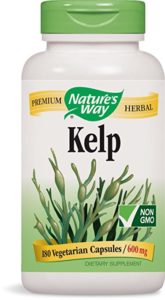
Nature’s way provides an excellent source of natural and highly purified forms of vitamin B12, B6, magnesium, zinc, iron, calcium, potassium, selenium, copper, manganese, chromium, molybdenum, boron, and omega 3 fatty acids. It contains no artificial colors, flavors, preservatives, or sweeteners.
If you want your iodine as near to its natural state as possible, go for the solid iodine tablet.
2. Zhou Thyroid Support with Iodine
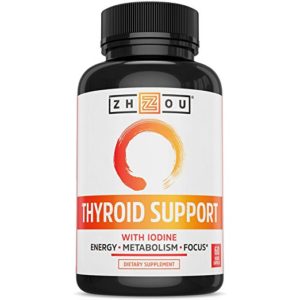
You must take some good-quality vitamins and minerals to improve your thyroid health. One of the best options for doing so is by taking Zhou Thyroid Support.
It’s a good option for people who want to supplement their diet with additional nutrients, but if they just need to add some extra iodide to their diet, better options are available.
3. Pure Encapsulations Iodine
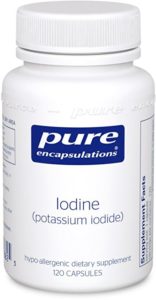
Pure Encapsulations provides a simple way for vegans to get their daily dose of vitamin D by using a vegetarian capsule containing 225 mcg of elemental (iodized) calcium and 125 mcg of potassium iodide.
If you want to start with iodine supplements, start by taking a low dose for a short period.
4. J. Crow’s Lugol’s Solution

Among the liquid-iodized solutions, J. Crow’s is the most effective one. It has a high iodide level and is widely recommended for treating hypothyroidism.
It was originally developed for drinking fountains but is now used in everything from shakes and smoothie mixes to toothpaste.
5. Benevolent Liquid Iodine
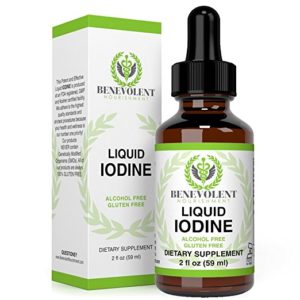
Benevolent offers a Liquid Iodine Supplement, which is useful for anyone who can’t or doesn’t wish to take tablets. It is also useful for mixing shakes, smoothies, or meal replacement drinks.
One dropperful (150 mcg) of this supplement contains 150 mcgs of iodide, which means this container will last you for quite some time. However, there is no way to precisely measure out a specific dose, so you won’t be able to tell exactly how much iodide you’re taking.
6. Life Extension Sea-Iodine
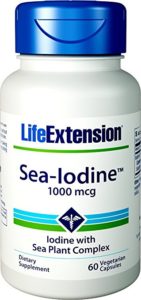
Life Extension provides iodine in a complex of seaweed and kelp extracts. It contains 1,000 mcg of iodine per capsule, making it an excellent way to boost your iodine intake quickly.
It’s because it’s delivered naturally that the body more readily absorbs it than supplements made from isolated compounds.
However, since it contains a very high dose of iodide, you should only use this supplement if you don’t get enough iodine from other sources in your diet.
7. Dr. Mercola’s Iodine
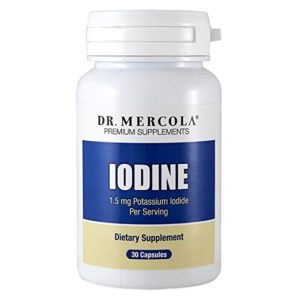
He sells a very minimalistic high-dose vitamin C supplement. It contains 1500 milligrams of vitamin C, but all of it is in its active form (ascorbic acid).
It may not be as effective as natural sources of dietary iodide, but it’ll still help you get enough iodide into your system quickly.
8. RLC Labs iThroid
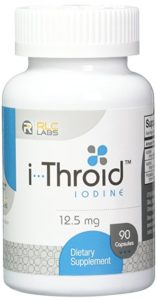
With 1250 mcg of Iodin per capsule, RLC Labs delivers lots of Iodin, both as KI and free Iodin.
It has a high dosage but doesn’t provide the same benefits as some other products.
However, the presence of excess amounts of certain nutrients in this product means that you should only use it if you’re specifically directed to take high doses of these specific nutrients.
9. Optimox Iodoral.
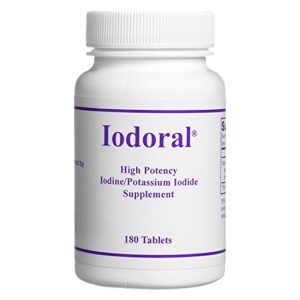
If you know you’re deficient in an important mineral, Iodoral should take first place. It contains a whopping 12500 mcg of elemental (unbound) iodonium per tablet, which means that each tablet provides a huge surge of iodonium for rapid correction of deficiencies.
Like other high doses of iodized salt, you should take this supplement for no longer than two weeks at a time, and it shouldn’t be used during any stage of your child’s development.
10. Global Healing Center Detoxadine

The Global Healing Center sells the liquid form of Iodin, which is in its pure atomic form. While the company claims this is an ideal form of Iodin for use in detox regiments, other nutritionists counter that salts of Iodin, like Potassium Iodide, are easier to digest by adults.
That, coupled with the fact that liquid supplements in low concentration are difficult to measure precisely, deters Detoxidine from ranking high.
The top iodine-rich foods to eat
The recommended dietary allowance (RDA) for iodine is 150 mcg daily for most adults, including pregnant and lactating women. However, some people may need more or less iodine depending on their age, health status, and other factors.
Iodine is found in many foods, but some are richer sources than others. This list ranks the top 11 iodine-rich foods based on their iodine content per serving.
1. Seaweed is the best source of iodine, with one gram providing over 500% of the RDA. Seaweed varieties such as kelp and nori are often used in sushi rolls and other Japanese dishes.
2. Cod is a popular fish rich in iodine and other nutrients like protein and omega-3 fatty acids. One hundred grams of cooked cod provides 99% of the RDA for iodine.
3. Shrimp is another seafood option high in iodine. One hundred grams of cooked shrimp provides 35% of the RDA for iodine.
4. Eggs are a great source of protein and other nutrients like choline and vitamin D. One large egg contains 27% of the RDA for iodine.
5. Dairy products like milk, yogurt, and cheese are also good sources of iodine. One cup (250 ml) of milk contains 24% of the RDA for iodine, while one cup (245 g) of plain yogurt provides 19% of the RDA. Cheddar cheese also contains small amounts of iodine, with one ounce (28 grams) providing 11% of the RDA.
6. Strawberries are a delicious fruit that can be enjoyed fresh or frozen. They’re also a good source of iodine, with one cup (152 grams) providing 14% of the RDA.
7. Lima beans are a type of legume rich in several nutrients, including fiber, magnesium, and potassium. They’re also a decent source, with one cup (172 grams) providing 12 percent of the RDA for this essential mineral.
8. Prunes are dried plums that make a healthy snack or can be used in recipes like prune leather or prune cake. They’re especially high in fiber, with three prunes providing 10%of the DA for this nutrient. Prunes are also a good source, with three prunes containing 10 %of the DA for this mineral.
9. Salmon is a great seafood choice because it’s not only high in protein but also high in healthy omega-3 fatty acids. Six ounces(170 grams)of cooked salmon provide 71 percent of the R D for this essential mineral.
10. Sesame seeds are an excellent topping for salads or baked goods. 11. They taste nutty and can be eaten whole or ground into tahini paste. Two tablespoons(32 grams)of sesame seeds contain 28 % of the R D for this essential mineral.
11. Navy beans are a delicious legume used in soups, chili, and other dishes. They’re especially high in fiber, with one cup(182 grams)providing 19 % of the R D for this nutrient.
How to get enough iodine in your diet
Iodine is a mineral found in some foods. It’s important for your thyroid gland to work properly.
Your body needs iodine to make thyroid hormones. These hormones help regulate your metabolism and affect growth and development. Not getting enough iodine can lead to an enlarged thyroid gland (goiter) and other brain development and function problems.
Seafood, seaweed, yogurt, eggs, and milk are all good sources of iodine. This mineral is also added to some salt products (iodized salt). You can also take iodine supplements if you need to.
Most people in the United States get enough iodine in their diets. However, certain groups are more likely than others to be iodine deficient. These groups include:
-People who don’t eat seafood or who eat very little of it
-Women who are pregnant or breastfeeding
-People with certain medical conditions that affect the gut, such as Crohn’s disease or celiac disease
-People who have had surgery on their stomach or intestines
The signs and symptoms of iodine deficiency
Iodine is a mineral that the body needs to produce thyroid hormones, which regulate growth and metabolism. These hormones regulate metabolism, which means that iodine plays an important role in keeping the body functioning properly.
The essential nutrient iodine helps the body produce thyroid hormones, which control metabolism, growth, and development. A lack of iodine can cause an enlarged thyroid gland (goiter), mental retardation, development delays, and even death.
Iodine deficiency is a major cause of goiters (an enlarged thyroid gland) and can lead to other health problems, such as intellectual disability and hypothyroidism.
There are a few different ways to get iodine into your system. The most common way is through iodized salt, which is table salt treated with iodine. You can also get iodine from seafood and other iodized foods. And if you’re looking to increase your intake, supplements are available. But with so many different products on the market, it can be hard to know which one is right for you.
That’s why we’ve researched to find the best iodine supplements on the market today. We’ve considered factors like dosage, form, and quality to ensure that you’re getting a product that will meet your needs. So whether you’re looking to prevent iodine deficiency or treat it, these are the products you should consider.
The risks of iodine deficiency
Iodine is found in various foods, but many people do not get enough iodine through diet alone and may need to take supplements.
Iodine deficiency can lead to several health problems, including goiter, hypothyroidism, and mental retardation. Severe iodine deficiency in pregnant women can also lead to birth defects.
While iodine supplements are generally safe for most people, some risks are associated with taking too much iodine. These risks include stomach upset, skin irritation, and allergic reactions. People with certain medical conditions such as autoimmune diseases or thyroid problems should speak to a doctor before taking iodine supplements.
Benefits of taking iodine supplements
Iodine is a mineral that’s necessary for good health, and it’s found in many foods. However, if you don’t get enough iodine through your diet or if you’re pregnant or breastfeeding, you may need to take an iodine supplement. Iodine is important because it helps your body make thyroid hormones; these hormones control metabolism and regulate growth and development. Here are some of the potential benefits of taking iodine supplements:
Iodine strengthens the immune system.
Iodine is a trace mineral that plays an important role in human health. It’s believed to help the body fight infections, support the immune system, and promote healthy thyroid function.
Iodine strengthens the immune system by helping it produce antibodies, T cells, interferon, interleukin, and other substances necessary to fight infections.
It helps to fight off infections.
Iodine is an essential mineral that helps to fight off infections. It produces white blood cells, the body’s first line of defense against pathogens such as bacteria and viruses. Iodine also aids in digestion and keeps the thyroid gland working properly.
Helps produce thyroid hormones.
Iodine is an essential mineral that helps produce thyroid hormones. Thyroid hormones help regulate metabolism and are necessary for normal growth and development. Infants require iodine-rich breast milk, as do pregnant women, who must pass this nutrient on to their developing babies.
Iodine deficiency can lead to hypothyroidism (underactive thyroid), which causes weight gain, fatigue, joint pain, and sensitivity to cold temperatures; hyperthyroidism (overactive thyroid); and goiter (enlarged thyroid gland). Iodine deficiency is a major cause of preventable mental retardation in children worldwide. The most severe cases of iodine deficiency lead to cretinism—a condition associated with severe mental disability and growth abnormalities resulting from severe retardation at birth, followed by delayed physical development during childhood due to long-term effects of malnutrition on brain development.
Aids with weight loss.
Iodine is a necessary thyroid hormone component and helps regulate metabolism.
But did you know that iodine can help you lose weight? Research shows that taking iodine supplements will increase your metabolism, which means you’ll burn more calories throughout the day. If you take enough iodine, it’ll even speed up how fast you burn those calories!
In addition to helping with weight loss, there are other ways iodine can improve your health:
Taking iodine supplements can benefit your health.
To ensure you’re getting enough iodine, it’s important to know how much is recommended. The average daily requirement is 150 mcg (micrograms), but this number varies depending on age and sex. Pregnant women need an additional 50 mcg per day while breastfeeding women should take 200 mcg.
To make sure that you are getting the proper amount of iodine in your diet, focus on eating foods rich in the mineral such as kelp and dulse seaweed; fish such as salmon, tuna, and cod; dairy products like yogurt; eggs; potatoes; saltwater plants like kale or spinach; seaweed salad with sesame oil dressing (for example, Asian-style); cheese pizza made with low-fat mozzarella cheese instead of regular pizza dough (dairy products contain high amounts of iodine). Taking supplements may be necessary if you cannot find a local source for these foods.
The side effects of iodine supplementation
Iodine is a mineral that the body needs to produce thyroid hormone, which helps regulate metabolism. It’s also necessary to produce thyroid hormones, vital for regulating metabolism, growth, and development. Although iodine is found naturally in some foods, such as seafood and seaweed, many people may not get enough of it through their diet. This can lead to iodine deficiency, which can cause problems with the thyroid gland and result in a condition known as hypothyroidism.
Iodine supplements are often recommended for deficient people or those with a history of thyroid problems. However, it’s important to be aware that taking too much iodine can also be harmful. Iodine toxicity is a relatively common problem when people take too many supplements or consume large amounts of iodine-rich foods.
Iodine toxicity can cause a wide range of symptoms, including:
- Nausea and vomiting
- Diarrhea
- Abdominal pain
- Headaches
- Dizziness
- Fatigue
- Weakness
- Irritability
In severe cases, iodine toxicity can lead to coma and even death. If you experience any of the above symptoms after taking an iodine supplement or eating iodine-rich foods, it’s important to seek medical attention immediately.
Recommended Dosage
Iodine is an essential trace mineral responsible for a range of functions in the body, including regulating metabolism and thyroid function. It’s also found in seafood products like tuna and codfish and sea vegetables like kelp. It’s important to note that iodine deficiency can lead to hypothyroidism, which is why many supplements with this nutrient. While there are no official recommendations for how much iodine you should take each day, there are some guidelines you can follow based on your age and gender:
Additional iodine supplementation
If you’re already taking a multivitamin and mineral supplement, you may not need additional iodine supplementation.
Many multivitamins contain iodine, but the amount of iodine in these supplements may not be enough to meet your daily needs. If you have a thyroid condition or are pregnant or breastfeeding, talk to your doctor before adding any supplement with extra iodine. The FDA recommends that women avoid excess iodine during pregnancy because it can lead to birth defects. For this reason, many prenatal vitamins contain little iodine—a good thing for mom-to-be!
A safe daily dose of iodine ranges anywhere between 5 and 50 micrograms.
The RDA for iodine is 150 micrograms per day, but this number was established based on an average person who’s not pregnant or breastfeeding. For pregnant women, the RDA is 220 micrograms per day; for breastfeeding women, it’s 290 micrograms.
The recommended daily dose of iodine (the amount a healthy adult can consume without experiencing adverse effects) ranges between 5 and 50 micrograms. The upper limit of 50 micrograms is based on the assumption that you’ll obtain your daily intake through food sources alone—which may not be true if you’re low on iodine or don’t eat enough food as part of your diet.
You should consult your doctor before taking any supplements to ensure they’re safe for you and won’t interact with any medications you’re currently taking.
It’s important to consult with your doctor before using an iodine supplement.
If you’re taking medication for an existing thyroid condition, you must consult your doctor before using an iodine supplement. Thyroid medication can interfere with the uptake of iodine; if too much is taken, this can lead to hyperthyroidism and other complications. Iodine supplementation has also been shown to interfere with certain thyroid medications like levothyroxine (brand name Synthroid). Because of these potential interactions, checking in with your doctor before starting any iodine supplementation regimen is best.
Pregnant or breastfeeding women can benefit from 50 to 150 micrograms of iodine per day.
If you’re pregnant or breastfeeding, it’s important to ensure you get enough iodine. Iodine is an essential nutrient for pregnant and breastfeeding women. It helps ensure the proper development of their baby’s brains and nervous systems (and health).
Iodine is also critical in preventing the mother from developing an underactive thyroid, which can cause serious problems like miscarriage and stillbirth. Mothers deficient in iodine may produce babies with higher-than-normal levels of stimulating thyroid hormone (TSH), which could lead to congenital hypothyroidism in newborns.
The bottom line on iodine supplements
We’ve all heard that iodine is important for thyroid health. But what if you’re already getting enough iodine in your diet? Iodine is a trace mineral, meaning you only need a small amount to maintain good health.
Too much iodine can be harmful, leading to problems such as goiter and thyroid hormone imbalance. That’s why it’s important to get just the right amount. And that’s where iodine supplements come in.
Iodine supplements come in many forms, including tablets and capsules. The best way to take them is by mouth, either with food or on an empty stomach.
Iodine supplements are generally considered safe, but there are a few things to remember. If you have any medical conditions or are taking medications, please check with your healthcare provider before taking an iodine supplement.
FAQs about Iodine Supplements
Here are some frequently asked questions about iodine supplements:
Iodine supplements can help prevent iodine deficiency and the associated health problems. Iodine supplements may also be recommended for certain medical conditions that can cause iodine deficiency.
The World Health Organization recommends that all people who do not have access to iodized salt take an iodine supplement. This includes pregnant women and young children. In addition, people with certain medical conditions (such as diabetes or kidney disease) may need to take an iodine supplement. Ask your doctor if you need an iodine supplement.
The recommended daily allowance (RDA) for iodine is 150 mcg for adults and pregnant women, 220 mcg for breast-feeding women, 90 mcg for children aged 1–8 years old, and 120 mcg for children aged 9–13 years old. Higher doses may be needed for certain medical conditions. Ask your doctor what dose is right for you.
Too much iodine can cause side effects such as stomach upset, rash, or headache. Taking more than 1 gram of iodine daily can be dangerous and should only be done under the supervision of a healthcare professional.
Alex is a fitness aficionado, empowers others towards healthier, active lives through small, sustainable changes for lasting results. Visit Gearuptofit.com for insightful tips and resources to enrich a balanced lifestyle.
